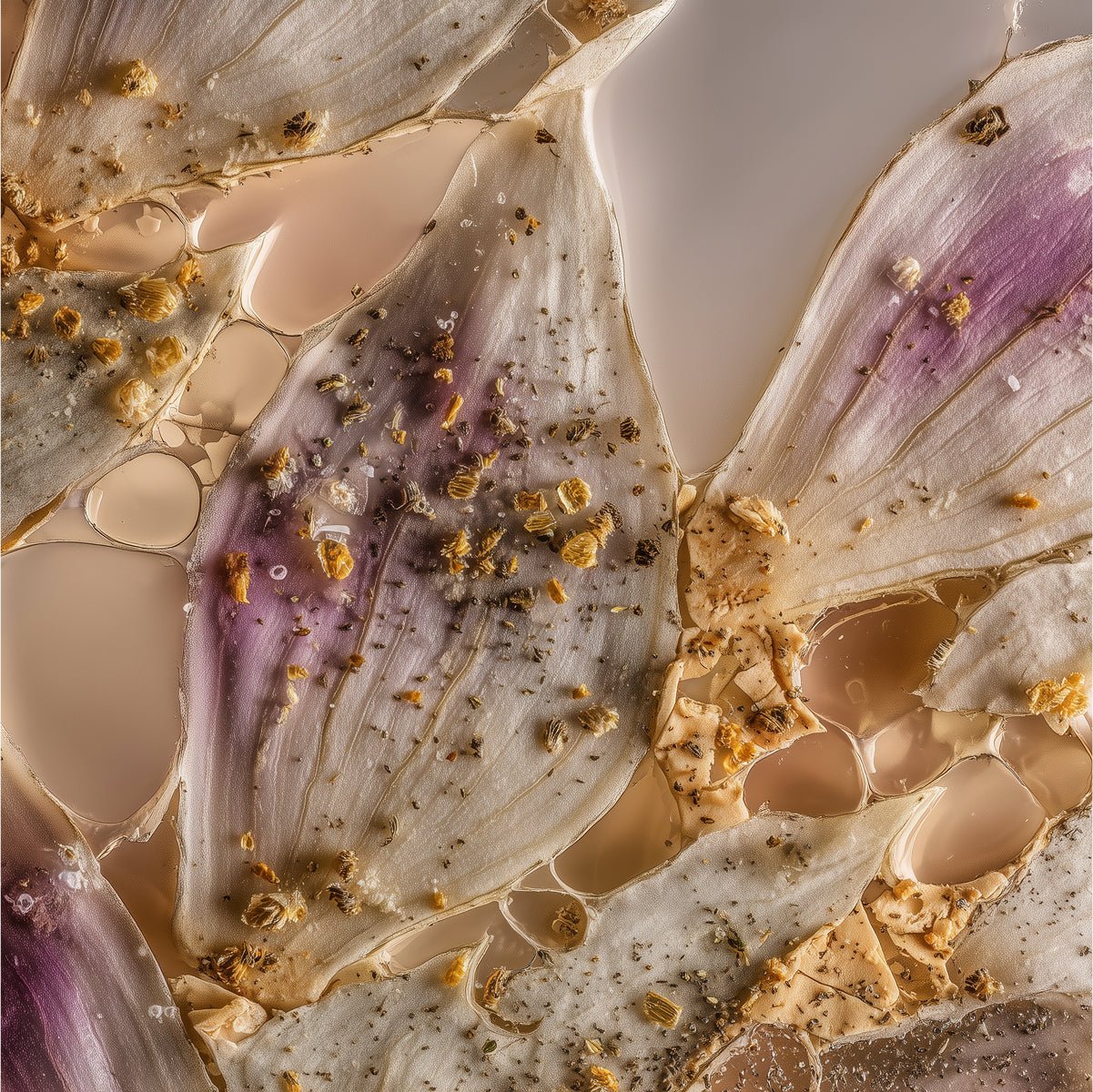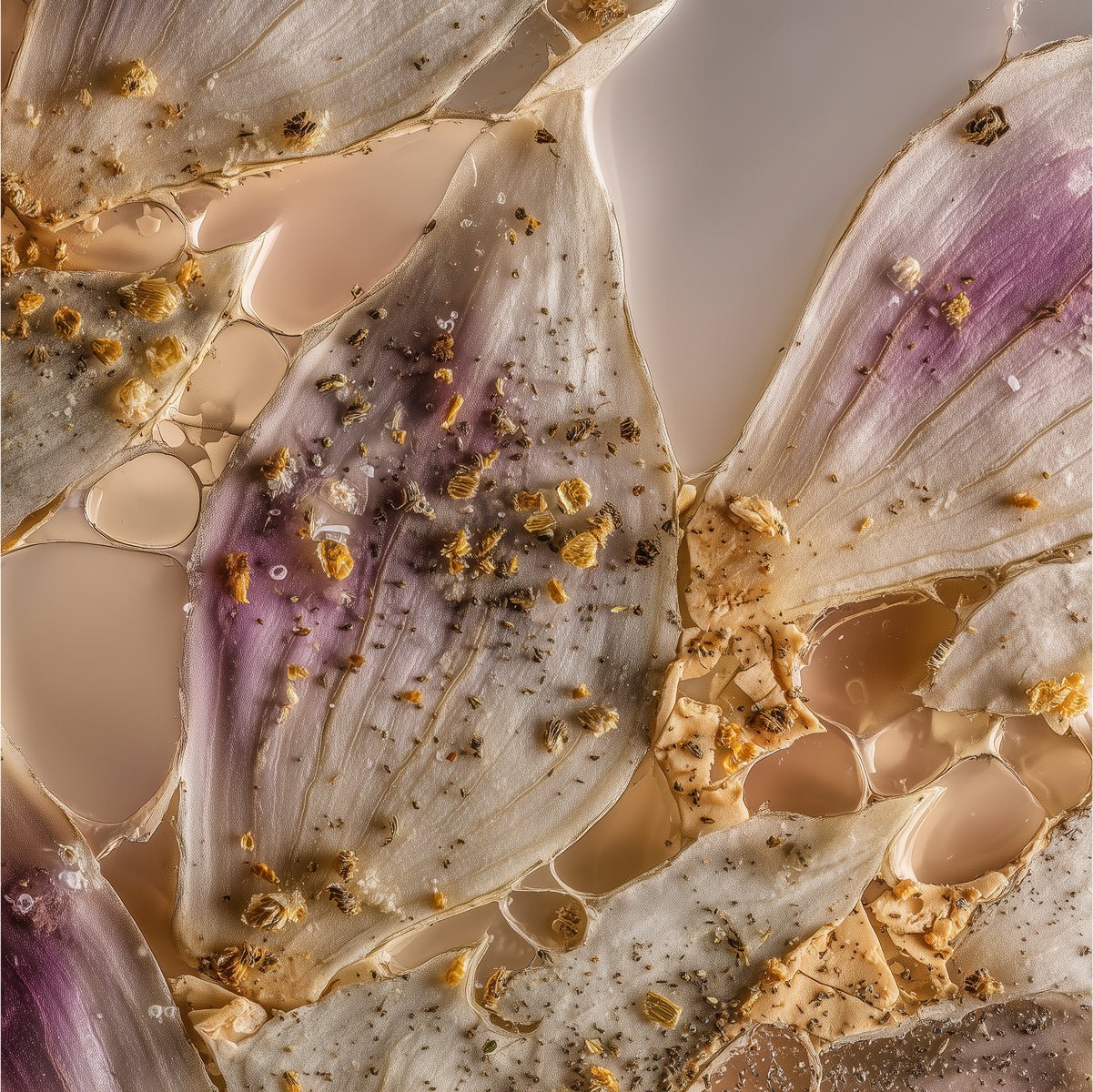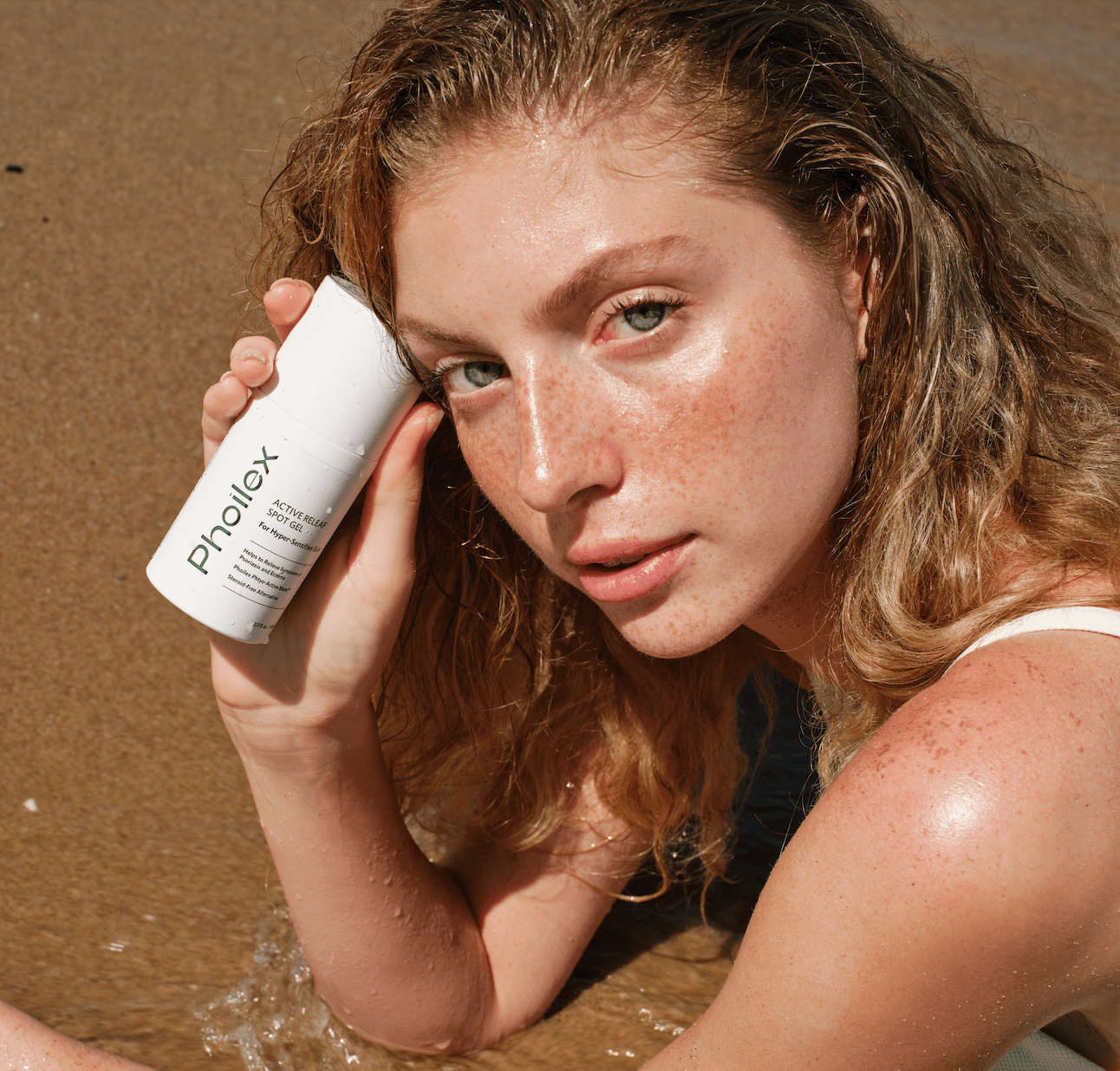Living with inflammation-prone skin can be a pain. You never know when you’re going to wake up with angry, red blotches all over your face, or whether that new moisturizer you were excited to try out will irritate your skin. And then there’s all the itching and dryness that you have to contend with.
If this is you, what you need is a trusted, natural anti-inflammatory skin care routine with calming skin products that soothe your skin (with a little bit of lifestyle and diet modifications to boot). That’s exactly what we’re going to cover here today: how to adopt a science-backed anti-inflammatory skincare routine with Phoilex, what ingredients to look out for (and which ones to stay away from), and what lifestyle changes to make.
Before we dive into all that, though, let’s answer an important question.
Why Anti-Inflammatory Skin Care Matters
Let’s go back to the basics for a minute. Inflammation is a normal immune system response and occurs when it’s fighting off foreign bodies to protect you. The problem arises when your immune system dysregulates and starts sending out signals even though there is no injury or infection to protect you from. This puts your body in a chronic inflammatory state, causing a host of skin problems.
Here’s how chronic inflammation impacts your skin.
Disrupts your skin barrier
The outermost layer of your skin, known as the skin or moisture barrier, is what protects the layers of your skin from external allergens and pathogens. It plays a major role in keeping your skin hydrated by preventing moisture from escaping.
When your skin is inflamed, your skin barrier weakens and doesn’t function properly. This leads to an increase in moisture loss, leaving your skin dry and cracked. A disrupted skin barrier also lets more pathogens sneak in, which causes further inflammation, creating a never-ending cycle.
Manifests as skin conditions
Chronic inflammation can trigger or worsen skin conditions such as psoriasis, eczema, rosacea, and acne. Psoriasis is a chronic inflammatory condition where your overactive immune system mistakenly starts attacking healthy skin cells, causing inflammation. These inflammatory chemicals crank up your cell growth speed, leading dead cells to accumulate on top of your skin in the form of discolored scales.
If you have eczema, even a tiny trigger can set off your immune system, causing inflammation and setting off a flare-up. Inflammation contributes to several key symptoms of rosacea, too: particularly, the redness and rashes. Inflammation is also one of the four main causes of acne.
Causes inflammaging
Aging is natural and happens to everybody, but did you know that chronic skin inflammation can actually speed up this process? Known as inflammaging, it refers to the subtle, ongoing way in which long-term inflammation makes you age faster.
Widespread inflammation slowly damages your skin cells and degrades your collagen and elastin (proteins that are necessary for maintaining the suppleness and elasticity of your skin). This accelerates the aging process, causing visible signs of it on your skin in the form of wrinkles, sagging and thinning skin, dullness, and hyperpigmentation.
Bottom line: Persistent inflammation can damage your skin by impairing your skin barrier function, triggering flare-ups of skin conditions like psoriasis, eczema, rosacea, and acne, and speeding up aging. This in turn can cause wrinkles, fine lines, sagging skin, and hyperpigmentation.
So, how do you keep it in check? By using gentle skincare products with anti-inflammatory ingredients.
| Natural Ingredient | Key Active Compounds | Research-Supported Benefits | Best Suited For |
|---|---|---|---|
| Colloidal Oatmeal | Avenanthramides, beta-glucans, saponins | Studies suggest it helps restore skin barrier function, reduces itching, and calms inflammation at the cellular level | Eczema, atopic dermatitis, general sensitive skin, disrupted moisture barrier |
| Centella Asiatica (Gotu Kola) | Madecassoside, asiaticoside, asiatic acid | Research indicates it promotes wound healing, strengthens skin barrier, and calms reactive skin | Rosacea, sensitive skin, post-procedure healing, reactive or stressed skin |
| Green Tea Extract | EGCG (epigallocatechin gallate), polyphenols | Studies show antioxidant properties that may help reduce UV-induced inflammation and calm irritated skin | Aging skin, inflammaging concerns, environmental damage, acne-prone skin |
| Licorice Root Extract | Glycyrrhizin, glabridin | Research suggests it helps reduce redness, calm inflammation, and may help with hyperpigmentation | Redness-prone skin, post-inflammatory hyperpigmentation, sensitive skin |
| Curcumin (Turmeric) | Curcuminoids | Studies indicate anti-inflammatory effects through multiple pathways when applied topically | General inflammation, acne, aging skin, environmental stressors |
| Allantoin | Allantoin (derived from comfrey or synthetic) | Research shows it supports skin healing, soothes irritation, and promotes cell regeneration | Healing skin, minor irritations, dry or cracked skin, post-inflammatory care |
| Calendula | Triterpenoids, flavonoids, carotenoids | Clinical studies suggest wound-healing and skin-calming properties for reactive skin | Reactive skin, minor wounds, contact dermatitis, sensitive skin |
| Fucoidan | Sulfated polysaccharides from brown seaweed | Emerging research indicates anti-inflammatory and hydrating effects on skin | Dehydrated skin, general inflammation, aging concerns |
| Fireweed (Epilobium) | Oenothein B, polyphenols | Studies suggest unique anti-inflammatory mechanism different from turmeric or ginger | Inflammatory skin conditions, sensitive skin, those seeking botanical alternatives |
| Aloe Vera | Acemannan, anthraquinones, vitamins | Research supports its use for soothing, hydrating, and supporting skin healing | Sunburn, minor irritations, dry skin, eczema (as supportive care) |
Science-Backed Anti-Inflammatory Ingredients
Before we look at a list of inflammation-reducing skincare ingredients, it’s time for a little bit of science again. The most visible signs of inflammation are redness or flushing, itching, swelling, dryness, or skin that’s warm to the touch. But what goes on under your skin? And how do skincare ingredients know what to do to soothe your skin? Lindsay Iftody, a chemist at Phoilex, sheds light on it.
“Inflammation in the skin can be measured by certain biological markers (also known as biomarkers),” says Iftody. “These are usually proteins, immune cells, or signaling molecules that increase when the skin is irritated, inflamed, or under stress.”
Iftody explains that anti-inflammatory ingredients in skin care work by targeting and modulating these biomarkers so that the inflammatory cascade is reduced. An example she gives is that Vitamin E neutralizes any free radicals before they can trigger a cytokine (an immune-signalling molecule) release, while aloe vera downregulates inflammatory triggers, promoting wound healing.
On that note, here are the most effective plant-based anti-inflammatory ingredients to help soothe inflammation topically.
Niacinamide and Allantoin
Niacinamide is a type of water-soluble Vitamin B3 that has a host of beneficial effects on the skin. Its potent anti-inflammatory properties help soothe your skin and reduce redness by blocking pro-inflammatory cytokines. Niacinamide also promoted skin barrier repair by stimulating the production of ceramides, fatty acids, and other lipids, which are substances that make up the outermost layer of your skin.
Allantoin, often derived from the comfrey or chamomile plant, is a skincare ingredient that boasts antioxidant, anti-inflammatory, and moisturizing properties. In addition to calming your skin, this compound also draws water into your skin, keeping it soft and hydrated. Allantoin also helps remove dead cells and promotes the repair of damaged skin.
Colloidal Oatmeal (Avenanthramides)
Colloidal oatmeal, which is the finely ground version of regular oatmeal, is known for its skin-soothing and antioxidant properties. It also restores skin barrier function and keeps your skin hydrated, making it a favorite ingredient for eczema relief products (such as the Phoilex Active ReLeaf Spot Gel). It also has the FDA and Health Canada nod of approval, so you’ll be in good hands with this plant-based skin care compound.
Centella Asiatica, Calendula, and Chamomile
Centella Asiatica, calendula, and chamomile are botanical anti-inflammatory ingredients, rich in antioxidants and phytochemicals. While calendula provides on-the-surface support by soothing red, itchy, and flaky skin, centella works beneath the surface to calm inflammation, boost collagen production, and help repair the moisture barrier. Chamomile is a similar herbal skin care product that helps soothe inflamed, itchy, red skin, moisturizes, and evens out skin tone by reducing visible signs of aging.
Green Tea, Turmeric (Curcumin), Licorice
Often found in soothing skin care products, these ingredients are potent antioxidants with anti-inflammatory properties. They help protect your skin from inflammaging by scavenging free radicals, provide sensitive skin relief by calming itching and redness, and even out your skin tone by targeting dark spots.
Fucoidan and Fireweed (Epilobium angustifolium)
These emerging plant-based botanical extracts show great promise in treating skin inflammation, boosting collagen production, and protecting from UV damage. Fucoidal, derived from brown seaweed, has been shown to suppress cytokines, reducing inflammation and providing relief from redness, itching, and dryness. It also improves skin elasticity and enhances your skin’s ability to retain moisture.
Fireweed, a perennial plant also known as the Rosebay Willow Herb, contains anti-inflammatory agents such as flavonoids and phenolic acids that decrease the activity of pro-inflammatory enzymes. Its skin-soothing and healing properties also make it a great calming ingredient for psoriasis or eczema.
Salicylic Acid and Bakuchiol Salicylate
While bakuchiol and salicylic acid are great ingredients on their own, they work even better together. Their dual anti-inflammatory and exfoliating properties soothe your skin and help remove dead cells, making them a great option for treating acne, eczema, or psoriasis. Bakuchiol salicylate also makes for a gentler retinol alternative by firming up your skin and reducing signs of aging. You get the benefits of many ingredients in one, aligning with skinimalism’s motto of “less is more.”
Bottom line: The main takeaway from here is that botanical actives can help you reduce inflammation without the unwanted side effects that come with topical steroids. Iftody says that she has noticed an increase in patients requesting steroid-free or plant-based solutions. “In these conversations, I explain that botanical actives can play different roles depending on whether they are applied externally or taken for internal support,” she says.
Iftody elaborates by saying that turmeric finds its place in addressing internal inflammation and supporting liver regulation, whereas blends designed for the skin (such as Phoilex’s grapeseed-based Active ReLeaf Spot Gel) are formulated specifically for external inflammation. “I emphasize the importance of choosing the right formulation for the right purpose, whether it is internal balance or external symptom relief,” she says.
Active vs. Avoid: What Really Works (And What Doesn’t)
Chronic inflammation can be caused by a variety of factors, with harsh skincare ingredients being one of the triggers.
Here are some anti-inflammatory skincare dos and don’ts:
|
Do |
Don’t |
|
Use thoughtfully formulated products containing natural anti-inflammatory and skin-soothing ingredients |
Use products that contain harsh chemicals such as parabens and sulfates as they can strip your skin’s natural oils and trigger inflammation |
|
Use fragrance-free products as fragrances (whether natural or synthetic) can irritate and inflame your skin |
Use alcohol-based products as they can irritate and dry out your skin |
|
Moisturize thoroughly to keep your skin hydrated |
Use harsh exfoliants as they can cause tiny tears in your skin, setting off inflammation and causing redness |
|
Use spot treatment creams for flare-up zones, such as Phoilex’s Active ReLeaf Spot Gel |
Use photosensitizing ingredients like citrus oils or glycolic acid as they can make your skin more sensitive to UV rays |
|
Use hot or hard water, as it can strip your skin’s barrier, leaving you more susceptible to inflammation |
|
|
Use steroid-based creams as they can have a lot of side effects with long-term usage |
Iftody explains that during active flare-up periods, using over-the-counter anti-inflammatory skincare is a great way of helping ease symptoms of chronic conditions like eczema, psoriasis, and rosacea, and bring some relief. “By helping ease physical symptoms, you can help ease the toll these conditions have on patients' mental health as well by aiding in better sleep and helping with physical confidence,” she says.
How to Build An Anti-Inflammatory Skin Care Routine with Phoilex
Here’s a gentle, step-by-step routine for natural skin inflammation relief.
-
Start with a gentle cleanse: Cleansing is the first step of any skincare routine as it clears your face of any dirt, impurities, and dead cells that may clog your pores. Use a gentle, non-foaming cleanser designed specifically for sensitive skin that won’t strip your natural oils, leaving your skin dry and tight. Once done, pat yourself dry with a microfiber or cotton towel.
-
Spot treat your active flare-up zones: Soothe your itchy, dry, and flaky skin and reduce redness with a spot treatment gel such as Phoilex’s Active ReLeaf Spot Gel. Stay away from steroids and opt for plant-powered products, as steroids come with many side effects when used long-term.
-
Layer it with a calming serum: Look for ones that contain anti-inflammatory, antioxidant, and hydrating agents to help calm your stressed-out skin.
-
Seal in hydration with a moisturizer: Moisturize your skin with a product that contains calming ingredients such as ceramides and works on restoring your skin’s barrier function.
-
Lather on sunscreen: Whether you’re going out or not, applying sunscreen is a must to protect your skin from UV damage. Look for 30+ SPF sunscreens and choose mineral-based ones over chemical ones, as the latter can irritate your skin.
-
Fight inflammation from the inside out: Your liver, gut, and skin are all interconnected, meaning internal inflammation can manifest on your skin in the form of redness, itching, or dryness. So, a holistic inflammation management routine involves inside-out support. You can do this by adopting an anti-inflammatory diet and getting some extra support from liver and gut supplements (such as Phoilex’s Liverty Dynamic Drops).
-
Make simple lifestyle modifications: Wearing loose clothes, using cold water to cleanse, and practicing stress-relieving techniques can all help you fight inflammation.
Combat Inflammation for Healthier Skin
Whether you have skin conditions like eczema, psoriasis, rosacea, and acne, or are just prone to having dry, flaky skin, inflammation might be the culprit. But you can fight this by using sensitive skincare products made with science-backed calmers, such as niacinamide, aloe vera, tea tree oil, and colloidal oatmeal.
All of Phoilex’s products are formulated with these botanical powerhouses to calm your reactive skin. No steroids, no junk. Just pure relief.
Say goodbye to inflammation by getting topical and internal skin support with Phoilex’s ReLeaf and Recover Set.
FAQs
Q: What causes chronic skin inflammation and why does it matter for my skincare routine?
A: Chronic skin inflammation occurs when your immune system becomes dysregulated and sends out inflammatory signals even without injury or infection present. This persistent inflammation disrupts your skin barrier, can manifest as conditions like eczema or rosacea, and accelerates skin aging through a process called "inflammaging." An anti-inflammatory skincare routine helps calm this overactive immune response and protects your skin's natural barrier function.
Q: Which natural anti-inflammatory ingredients are most effective for calming irritated skin?
A: Science-backed natural anti-inflammatory ingredients include niacinamide and allantoin for barrier repair, colloidal oatmeal (avenanthramides) for soothing irritation, and centella asiatica, calendula, and chamomile for reducing redness. Additional powerful options include fucoidan and fireweed (Epilobium angustifolium), green tea, turmeric (curcumin), and licorice root extract, all of which have clinical evidence supporting their anti-inflammatory properties.
Q: How is bakuchiol salicylate different from regular salicylic acid for inflammation
A: Bakuchiol salicylate combines the gentle, retinol-alternative properties of bakuchiol with the exfoliating benefits of salicylic acid, making it less irritating than traditional salicylic acid alone. This combination provides anti-inflammatory benefits while still addressing acne and congestion, making it ideal for sensitive, inflammation-prone skin. It offers a gentler approach to treating inflammatory skin conditions without the harsh side effects of conventional acids.
Q: Can my diet and lifestyle actually impact skin inflammation?
A: Yes, diet and lifestyle modifications play a significant role in managing skin inflammation alongside topical skincare products. Anti-inflammatory foods, stress management, adequate sleep, and avoiding inflammatory triggers can help reduce the internal factors that contribute to chronic skin inflammation. When combined with a targeted anti-inflammatory skincare routine, these lifestyle changes create a comprehensive approach to achieving calmer, healthier skin.
Q: What ingredients should I avoid if I have inflammation-prone skin?
A: People with inflammation-prone skin should avoid harsh ingredients that can further irritate or disrupt the skin barrier and trigger inflammatory responses. Common culprits include high concentrations of alcohol, synthetic fragrances, certain essential oils, and overly aggressive exfoliants. Instead, focus on gentle, science-backed anti-inflammatory ingredients that support skin barrier function and calm reactive skin.
Q: How do I build an effective anti-inflammatory skincare routine with natural products?
A: An effective anti-inflammatory skincare routine should include gentle cleansing, hydrating products with barrier-supporting ingredients like niacinamide and allantoin, and targeted treatments containing proven anti-inflammatory actives like centella asiatica or fucoidan. Layer products from thinnest to thickest consistency, and introduce new anti-inflammatory ingredients gradually to monitor your skin's response. Consistency is key—give your routine at least 4-6 weeks to show visible improvements in inflammation and skin calm.
Q: What is inflammaging, and how does it affect my skin as I get older?
Q: How does colloidal oatmeal actually work to calm eczema and repair the skin barrier?
Q: Why does a damaged skin barrier lead to more inflammation, and how can I break this cycle?
Q: What's the difference between acute and chronic skin inflammation, and how do I know which I have?
Q: Are there natural alternatives to steroid creams for managing conditions like psoriasis or eczema?
Q: Why do some people develop sensitivities to skincare ingredients as they age?
Q: Can lifestyle factors contribute to chronic skin inflammation beyond what products I use?
Q: What natural ingredients are considered safe for skin inflammation while breastfeeding?
Read more

Your liver plays a key role in keeping the ecosystem of your body balanced, with its main function being that of a cleaner since it filters the toxins from your blood. But what happens when your li...

The shift towards holistic, non-toxic skincare has made one thing clear: some of the most skin-friendly ingredients aren’t made in a lab, but found in nature. Milk thistle, a purple flowering plant...
